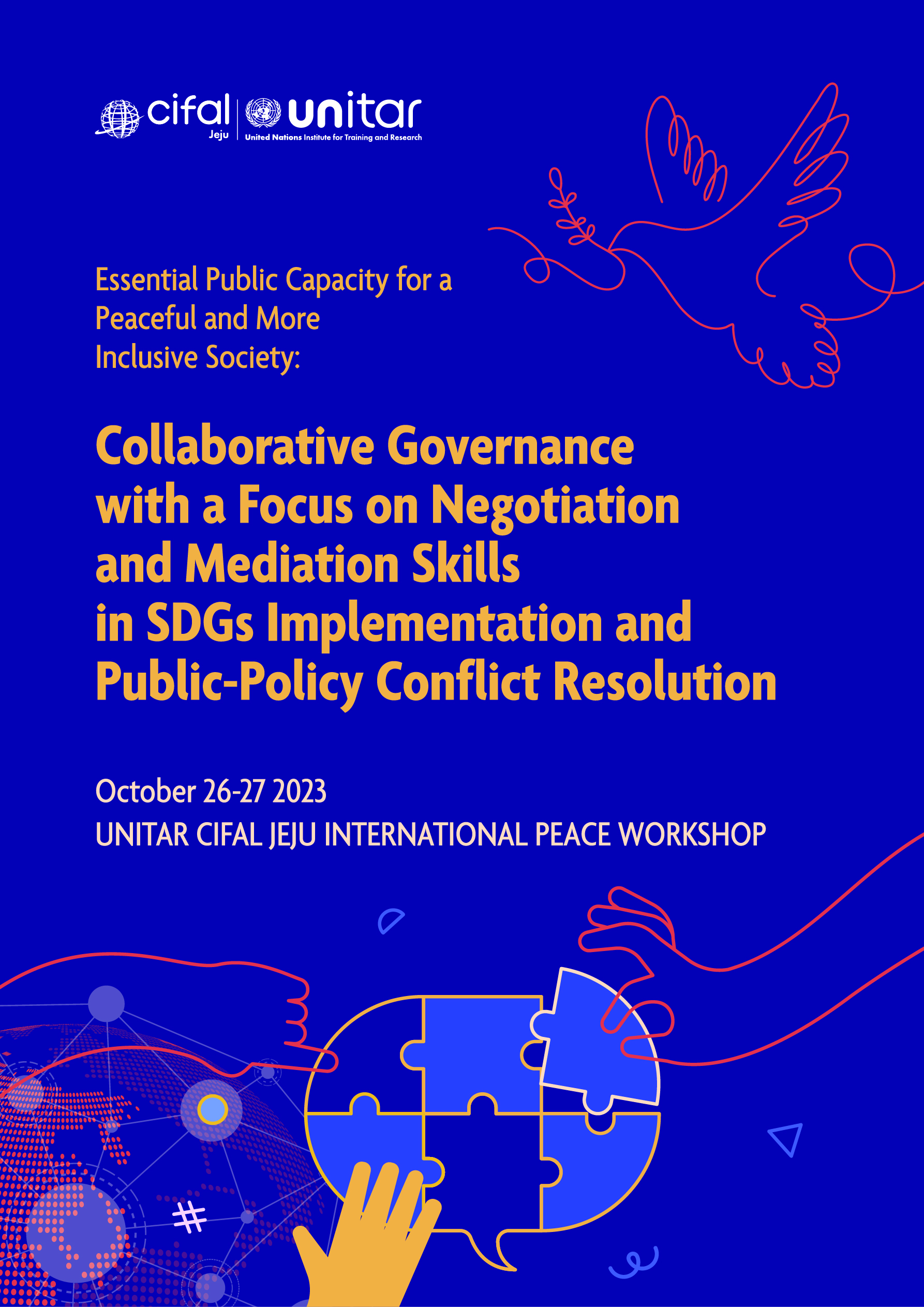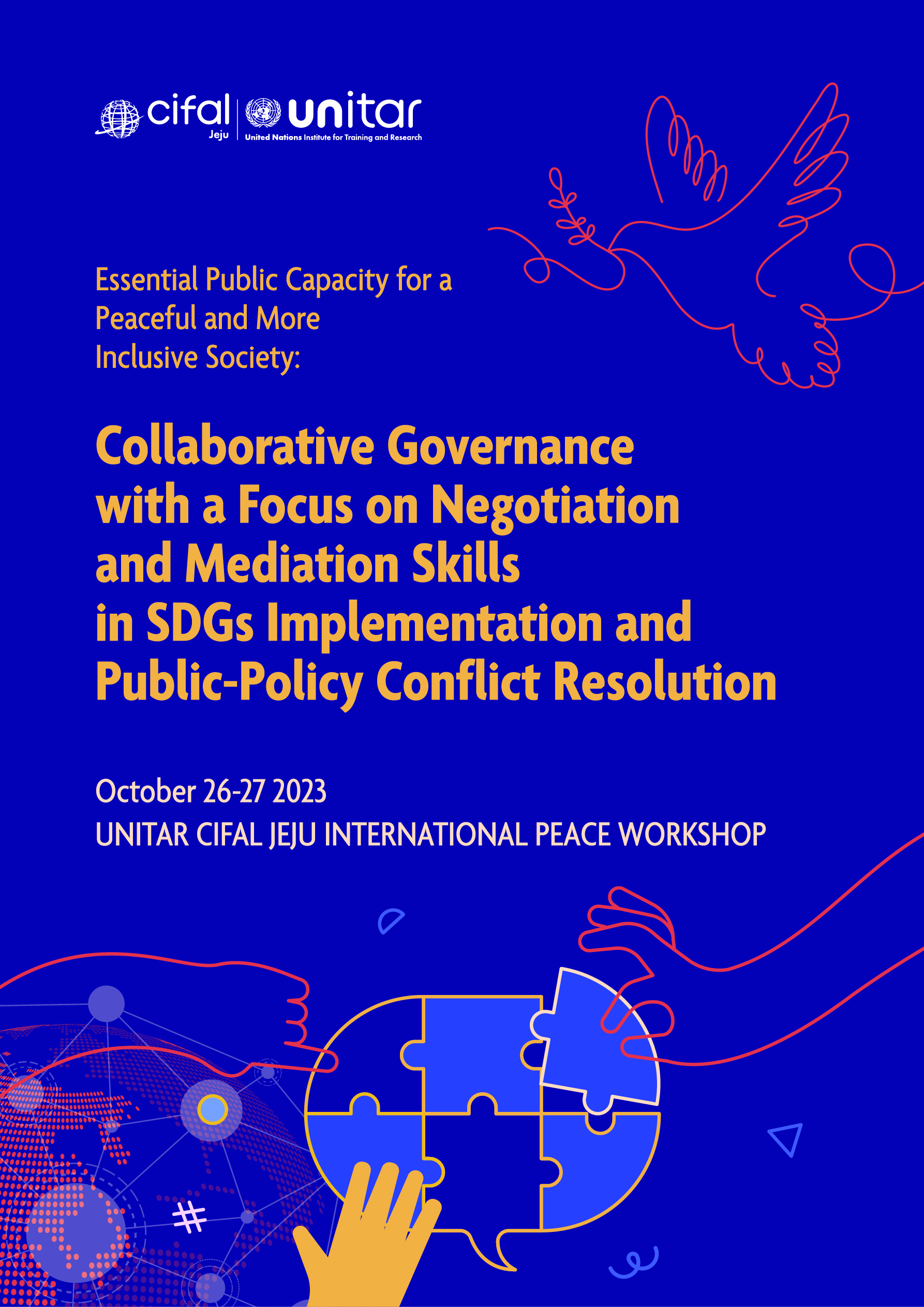
 2023.09.28
2023.09.28
|
Essential Public Capacity for a Peaceful and More Inclusive Society: Collaborative Governance with a Focus on Negotiation and Mediation Skills in SDGs Implementation and Public Policy Conflicts Resolution26-27
October (Thursday-Friday), Jeju International Training Center
10:00-17:00 (Seoul Time) Background
National and local authorities today find themselves under continuous pressure to spearhead public projects, such as infrastructure development as the society and its citizens expect more refined and improved services from national and local governments. However, such continuous demand for public goods will inevitably bring about conflicts among interested parties, potentially reshaping the fortunes of winners and losers alike. And, if these transitions are mismanaged or inequitably implemented, they may give rise to significant public policy conflicts within societies. Under these circumstances, it is imperative that these initiatives are carefully and fairly executed to avoid tensions and disparities.
Government officials who took part in the 2022 workshop 'Essential Tools for a Peaceful and More Inclusive Society: Skills and Systems for Local Conflict Management,' hosted by UNITAR CIFAL Jeju, analyzed these potential conflicts using local conflict analysis and management methodologies.
Furthermore,
governments today face an increasingly complex landscape, dealing with a
multitude of citizen interests and demands arising from political, economic,
social, and technological advancements[3]. In response to these multifaceted
challenges, one emerging and recommended approach to governance is
collaborative governance, providing a promising pathway to tackle these complex
challenges.
Collaborative
Governance introduces a framework for a collective endeavor from public sector,
non-profit organizations, and private businesses. These stakeholders
collaborate, share the responsibilities associated with both policymaking and
service delivery that could have been challenging to achieve through traditional
governmental decision-making processes[4]. Typically, in practical
applications, collaborative governance frequently entails conflicting parties
coming together to peacefully resolve disputes through negotiation or
mediation.
Considering the government’s pivotal
role in overseeing the coordination and resolution of conflicts in public
policy, it is essential for government officials to possess abilities for
managing the diverse demands arising from multiple stakeholders. Proficiency in
negotiation and mediation is particularly crucial in this regard. This is in
line with the OECD’s guidance to governments that conflict resolution skills
are considered a fundamental and recommended competency for accomplished civil
servants[3].
Hence,
to foster collaborative governance practice with the aim of facilitating the
implentation of SDGs, we will organize a dynamic two-day workshop, to help strengthen
negotiation and mediation skills to help manage and resolve public policy conflicts
by civil servants. This workshop will provide an in-depth learning opportunity,
including the introduction of negotiation and mediation skills of managing and
resolving public policy conflicts and the application of them through
individual and group practice sessions. Throughout this workshop, participants
will gain valuable insights into the government's pivotal role in orchestrating
cooperative governance by involving various stakeholders in SDG achievement.
This
intensive learning opportunity primarily targets government officials
responsible for handling public policy conflicts, particularly those associated
with local policies aligned with SDGs. Especially, this workshop will invite
participants primarily from the Jeju Special Self-Governing Province and
various developing countries to contribute to enhance essential public capacity
for the execution of diverse goals in SDGs. Through this workshop, we believe
participants, in decision-making roles, may build up perspectives towards public
policy conflicts, while also finding ways to peacefully manage them and uncover
hidden values within the conflicts, vital to making a more sustianable, peaceful,
and resilient societies.
[1] Joachim Monkelbaan, Governance for the
Sustainable Development Goals – Exploring an Integrative Framework of
Theories, Tools, and Competencies, 2019 [2] UNITAR CIFAL JEJU, Essential Tools for Peaceful and More Inclusive Society: Skills and Systems for the Local Conflict Management, 2022 [3] OECD, OECD Public Governance Reviews-Skills for a High Performing Civil Service, September 2017 [4] Voets, Brandsen, Koliba, & Verschuere, Oxford Research Encyclopedia of Politics, 2021 Event
Objectives
This
capacity-building training workshop will:
- Foster
awareness regarding the significance of peaceful management of public policy
conflicts through collaborative governance in the context of SDGs
implementation;
- Introduce
fundamental principles of managing and resolving public policy conflicts:
negotiation and mediation;
- Enhance
participants' proficiency in these essential skills through a combination of
individual and group exercises;
- Showcase
exemplary local practices managing and resolving public policy conflicts;
- Facilitate
opportunities for participants to exchange their own professional experiences
related to public policy conflicts, enabling them to collaboratively develop
strategies for effectively managing or resolving potential conflicts, drawing
on the expertise of fellow participants and conflict management professionals. Expected
Learning Outcomes
By the end of the training,
participants will be able to:
- Recognize the importance of participants’ role as
government officials in terms of facilitating SDGs in the local level and spearhead
related policy development and implementation through multi-stakeholder
collaboration;
-Identify and concretize existing and potential public
policy conflicts within participants' respective countries or municipalities,
emphasizing the critical role of public conflict management in fostering a
peaceful and inclusive society;
-Become more fully equipped with negotiation and
mediation skills to orchestrate collaborative governance that
serves as a cornerstone for SDG implementation;
-Examine
and draw insights from benchmarking cases of public conflict management systems
and successful examples of managing and resolving public policy conflicts; -Build professional networks and exchange information, ideas and knowledge among the participants. Target
Audience
This
invitation-based training is mainly open to the Jeju Speicial Self-Governing
Provincial Government officials who are currently undergoing 1-year official on-the-Job
training and invited civil servants from developing countries, who are daily dealing
with various public policy conflicts at the national level and below or are
mandated to manage and resolve these to achieve common goods in line with the
Sustainable Development Goals. Methodology
The training will be comprised of: -
Individual
Pre-Assignments -
Lectures and presentations by experts -
Individual and Group Exercises Venue
Offline (Jeju
International Peace Center, Seogwipo-si, Jeju-do, Republic of Korea)
Participants Registration Invited participants will be asked to complete the registration by October 8, 2023 (Sunday) using the Google Form provided by the Program Officer, which will be made available between October 5th and sent to the participants in person.
Certificate
A Certificate of Completion will be issued by UNITAR and UNITAR CIFAL Jeju. Selected participants are required to complete the following to be eligible for this certificate: - Punctually Attend all sessions; and - Create and Submit pre-assignments and all outcome documents produced in practice sessions - Fully and actively participate in the entire training program Contact
Ms. Hyunju Grace Lee, Program Officer/UNITAR CIFAL Jeju E-mail: cifaljeju.jitc.env@gmail.com
*The above program is subject to change
|
||||||||||||||||||||||||||||||||||||||||||||








